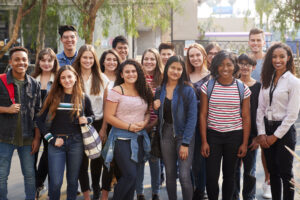Academic competitions in high school are a great way to show off your talents to admissions officers, especially if you place highly. This gives a benchmark for your performance against other smart and talented students, with a third party arbiter to confirm your achievements.
We’ve looked at some of these competitions before, and we’re going to be exploring another today: Odyssey of the Mind (frequently abbreviated OM). In this article we’ll cover what it is, how you can compete in it, and what benefits it can bring to your college applications. Let’s get started!
What is Odyssey of the Mind?
OM is a creative academic competition, where teams present their unique solution to one of several problems by means of a performance. It was founded in 1978 by C. Samuel Micklus. Beginning at Rowan University hosting teams from New Jersey alone, the competition is now international, with teams from dozens of countries competing in the final “World” round.
There are four divisions for OM, separated by age/grade. These are:
- Division 1: grades 3-5, all team members must be under 12 years of age on May 1 of the competition year (this is true of all age caps).
- Division 2: grades 6-8, all team members must be younger than 15.
- Division 3: grades 9-12, the oldest team member does not qualify for division 1 or 2, and is attending a regular school/high school equivalent, not a college or university.
- Division 4: Collegiate, all team members must have a high school diploma or equivalent, and be enrolled in at least one course at a two or four year college.
The oldest member of a team determines what division the team competes in.
Teams in divisions 1-3 have one adult (usually a teacher) serve as their mentor. The mentor is not allowed to contribute to the solution of the problem, but is there to assist and advise as needed, and to supervise.
Odyssey of the Mind’s Competition Structure
OM’s competition is in two parts. The first is the long term problems. There are five problems offered each year, one for each of the five following categories:
- Vehicle, which requires building a vehicle or vehicles capable of performing specific tasks.
- Technical, which requires building a contraption to perform a task.
- Classics, which requires knowledge of history, art, architecture, or literature.
- Structure, which involves building a structure out of balsa wood which can support the highest possible weight.
- Performance, which requires acting, singing, or other performance elements on a specific theme.
Note that each problem often involves elements from the others; all solutions must be presented in the form of a performance for instance, and you may earn bonus points for including historical references or technical knowledge even in an event which does not require them. Generally, one of the long term problems is sponsored by NASA each year.
Teams are given multiple months to design and complete their solution to the problem they choose, usually beginning with the start of the school year in September. You are limited to a budget of $145 for every material, costume, prop, and set. This is to encourage innovative solutions and creativity when approaching the problem, and to level the playing field across economic access.
Teams are also required to complete the solutions entirely on their own. OM’s rule on outside assistance means that coaches and parents can help students focus and supervise tasks only; all of the actual work must be done by the students on the team. This means all planning, script writing, set design, construction, sewing of costumes, and otherwise must be done by the students themselves.
Whatever solution they create, they have 8 minutes total to deliver it to judges on the day of competition.
Spontaneous
The long term problem is only part of the competition. Teams also compete in the spontaneous round, where they are given a problem on the day of the competition and told to solve it. These problems take the following forms:
- Verbal: these questions are asked and answered verbally, and often involve word or logic puzzles.
- Hands-on: these puzzles make use of materials or props, and require physical manipulation of them.
- Hands-on Verbal: these puzzles use both physical materials and verbal questions and answers in some combination.
Up to seven students are allowed to be on a team, but only up to five may compete in the spontaneous portion. Coaches usually help students determine who is best suited to answer each type of question. You are given ten minutes to respond to the question in most cases.
It was a spontaneous question in the early days of OM that allowed elementary school students to compete. The problem was simple, there was a fish pond demarcated on the floor with tape, with paper fish inside, each with a different point value. Teams were given a box of supplies, and told to use them to construct some device to extract as many fish from the “pond” as they could within ten minutes. Each time a team member stepped over the line, it was a ten point penalty.
A ten year old assessed this, and asked the judge whether the penalty was for each instance, or by time spent inside. The judge confirmed it was one penalty for each time a student crossed the tape. The student said: “Ok, I’ll jump in, grab all the fish, and take your ten point penalty.”
This is the kind of mindset Odyssey of the mind seeks to foster; solving problems creatively by applying resources in novel and interesting ways. The rules are there to provide structure, and they must be followed, but, especially in the spontaneous problems, finding loopholes is encouraged and applauded.
Competitions and Winning
Teams compete regionally, then supra-regionally, then at world levels. The top scorers in each division are invited to progress to the next round. You may have fewer rounds depending on the size of your region and the number of competitors. The top two teams from each state and country go on to compete at worlds.
At each competition, teams present their solution to the long term problem, and complete a round of spontaneous. Each team in a division answers the same spontaneous question, which is new for each competition round.
Each team is given a score out of 350 points; 200 for the long term problem, 100 from spontaneous, and 50 from style. The long term scoring is curved, so the best performing team is given a perfect 200, with each team then having their score calculated based on their performance relative to the top scorer. Style is a separate portion of long term solution judging, where teams are evaluated based on specific elements within their solution and their integration with the performance, such as a specific prop or set piece. Three of these are pre-specified (so the vehicle problem always asks about the vehicle), but two are up to teams. Each of these is awarded 1-10 points.
Odyssey of the Mind and College Applications
Like many team-based academic competitions, Odyssey of the Mind can give you some great material for your essays and activities lists. The competition itself is well known, and the creativity and intellectual vitality of winning teams is well respected by colleges.
Further, as the team and everything they make must be done by the students themselves, OM gives you a great chance to show off your leadership skills. WHile you may not be a captain, you still have many chances to show off your initiative, and to take responsibility for some part of the process, be it script-writing, set design, or working out the technical aspects of the problem.
Of course, there are some downsides, namely the amount of time OM requires. While you can take part in it and other extracurriculars, it will be one of your main uses of time for the school year, requiring several hours a week on average.
Your school may or may not have an OM team already, or a teacher interested in serving as a coach for one. All you need to compete is a team of 3-7 people, a teacher to serve as a coach, and a place to store everything you build.
Final Thoughts
We hope this article has given you a good introduction to Odyssey of the Mind, and let you know whether it is the kind of opportunity you would benefit from exploring. While not every academic extracurricular is the right fit for every student, some will benefit greatly from the creativity it seeks to foster.
While we cannot help you with OM directly (the outside assistance rules apply to us as well), we have a long experience helping students find the academic activities which best support their talents and interests. If you want to learn more about our candidacy building service, and hear how we can help you specifically, schedule a free consultation today. We love helping students find and explore their passions.








